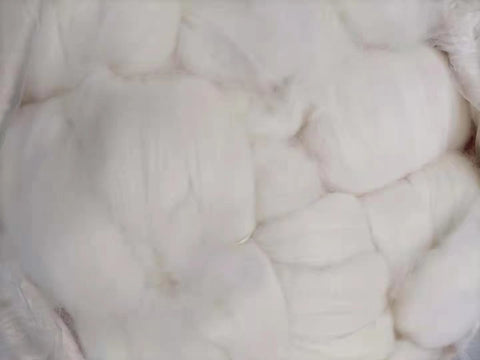SAVE UP TO 30% OFF
SAVE UP TO 30% OFF
Add description, images, menus and links to your mega menu
A column with no settings can be used as a spacer
Link to your collections, sales and even external links
Add up to five columns
Add description, images, menus and links to your mega menu
A column with no settings can be used as a spacer
Link to your collections, sales and even external links
Add up to five columns
What is Cashmere and why is it so expensive?
August 03, 2021 5 min read
What is cashmere?
Cashmere is a fiber obtained from cashmere goats, pashmina goats, and some other breeds of goat. It comes from goats which are mostly grown up within Asian areas such as Mongolia, Tibet, Northern India, Iran and Southwest China. It has been used to make yarn, textiles and clothing for hundreds of years. It is an extremely soft, expensive wool that is commonly used in scarves or shawls, jumpers and cardigans.
The cashmere grows when the weather getting cold in winter, it falls off when the weather turns warm in spring. It naturally adapts to the climate and belongs to a rare special animal fiber.

What is cashmere made of?
Cashmere wool is different from other wools in market, it is made of the hair on cashmere goats and it clings to the skin surface of these goats. In spring, these thin cashmere are grabbed by herdsmen with tools to become original cashmere.
Why is cashmere so expensive?
Cashmere price is different every year, it is usually decided by the annual output, material quality as well as the raw material handling process.
Limited production
Cashmere wool comes from goats which mainly grow in Northwest China, Mongolia, Iran, Afghanistan, and other areas. The temperature in these places are very cold in winter, so the quantity of cashmere goats is small, the cashmere material is limited.
The world's annual output of cashmere is 10,000 tons. One goat can only produce 50-80 grams cashmere a year. That is to say, the cashmere produced by 5 goats in a year can only make a common cashmere sweater. This is why cashmere is so expensive.
Warmer than any other wools
Cashmere is different from other wools in the market, it is 5-8 times warmer than the sheep's wool. If you wear a same weighted sweater in winter, the cashmere sweater is warmer than the wool one.
Season specific
Cashmere grows on goats only in winter and farmers can comb it next year spring, which means the manufactures only can buy cashmere in spring. They have to wait until farmers have combed cashmere from goats.
Intensive labor work with complex processes
In below paragraph you can see there are many steps to make cashmere. It needs intensive labor work to finish totally. It usually takes many days even months.
How is cashmere made?
The process of making cashmere is one complex process, usually there are these steps.
- Step 1. Cashmere catch
- Step 2. Cashmere selection
- Step 3. Cashmere washing
- Step 4. Carding
- Step 5. Laboratory color matching
- Step 6. Staining
- Step 7. Spinning
- Step 8. Weaving
- Step 9. Machine sewing
- Step 10. Hand sewing
- Step 11. Shrinking
- Step 12. Steam ironing
- Step 13. Selecting
- Step 14. Packaging
Cashmere catch
In May and June every year, herdsmen begin to catch cashmere for goats. In spring, when the weather gets warmer, cashmere begins to fall off naturally.
If the hair on the head of a goat begins to fall off, it is certain that the time for cashmere combing will come. When picking up the scissor, first cut off the outer long hair, and then use a thin comb to gently comb the grass and feces on the coat along with the hair, and then use a dense comb to comb cashmere against the hair.
The dense comb should be close to the skin, and the force should be even. Do not use too much energy to avoid damaging the skin.
Cashmere selection
In this step, the grass, goat dung, pebble, and other sundries need to kick off from the collected cashmere.
Cashmere washing
In the washing process, the impurities and smell in cashmere are removed and disinfected. We have one post on how to wash cashmere.
Carding
With the professional equipment, the mixed wool will be separated from cashmere to ensure the purity of cashmere.
Laboratory color matching
In this step, we need to look for the best dye method to dye colors.
Staining
With the laboratory color matching test, we dye the colors according to the ratio of the laboratory. Cashmere fiber has good hygroscopicity, the final color does not fade after dyeing with high saturation.
Spinning
With professional equipment, the dyed cashmere is processed into cashmere yarn.
Weaving
According to the design style with a certain procedure, the yarn is woven into a certain shape of cashmere one-sided.
Machine sewing
Sew one side of the knitted cashmere.
Hand sewing
Remove the sealing yarn after machine sewing and take off the thread.
Shrinking
Shrinking means that, under the wet and hot environment, cashmere intertwine with each other through friction, shrinks longitudinally and transversely to increase thickness and tightness, and forms a layer of short and dense fluff on the surface.
In this way, the fabric will be more compact, fuller in appearance, smooth in hand touch.
Steam ironing
After washing and shrinking, steam ironing can make the product in good condition for the shape and style.
Selecting
The inspector selects the wool from cashmere that may remain on it to ensure its comfortability.
Packaging
After the inspection, fold the qualified cashmere products as required, put them into the packaging bag, then put them into the cartons smoothly.
With these steps above, the raw cashmere material is ready to make cashmere products.
What is cashmere used for?
Since cashmere is incredibly soft with good insulating properties, cashmere products are very popular for cold weather clothing and accessories.
- Clothing: Cashmere wool can be woven and knitted into a variety of cashmere garments. Cashmere sweaters, from cashmere cardigans or pullovers to crewneck or v-neck sweaters are very popular items, but cashmere can also be woven into coats, pants, and other items.
- Accessories: Cashmere accessories, like cashmere scarves for women, cashmere scarves for mens, gloves, and socks, are very popular cashmere items, as they are warm adding nice luxurious touches to any outfit.
- Home goods: Cashmere blankets are warm and luxurious, they are great as throws on a couch, chair, or bed.
Is cashmere wool cruel to animals?
NO, cashmere wool is not cruel to animals. Each year from March to May, farmers will comb cashmere from goats to make them feel lightweight. It is similar to cut off people's hair to keep relaxed. After the combing, farmers usually cut the out hairs short for goats too. In summer, the weather is hot, goats keep them feel cool when going outside for eating grass. So it is not cruel to animals.
Some people may ask do goats die for cashmere, the answer is definitely no. As we just talk, if farmers do not comb cashmere for goats, they will suffer from hot weather in summer.
On another aspect, cashmere wool will grow up like people's hairs by self, especially in winter, so goats will not die due to farmers combing.
Cashmere VS Wool
Cashmere is much thinner than wool, and the outer scale is also finer and smoother than wool. Therefore, it is light, soft, and tough. When wearing cashmere products, it is light, soft, smooth, and very comfortable, which is incomparable with any fiber. You can read this article for more information.
updated on March 23, 2022
|
About Ying Tang Miss Ying, cashmere products quality controller in Dr.Muxue, with 10 years of experience in cashmere material selecting and cashmere material purchasing, deeply knows the process of cashmere garment producing as well as how to take care of them. |
About Dr.Muxue
Dr.Muxue is one new brand in cashmere scarf industry, all products are 100% cashmere, made in Inner Mongolia. We are willing to offer excellent cashmere products for you.
Mens
Subscribe
Sign up to get the latest on sales, new releases and more …

